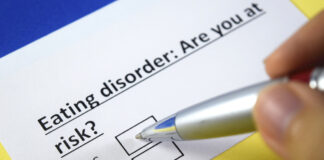Tag: DSM-5
“All Real Living Is Meeting”: Brent Robbins on Love, Death, and...
Psychologist and existential thinker Brent Robbins reflects on a lifetime of work, the limits of psychiatric diagnosis, and what facing mortality has taught him about joy and human connection.
The Grief Pill is Coming!
If you yearn or pine too long for your dead child, partner, spouse, or friend, you may be addicted to grief, according to the new revision of the DSM.
The New DSM Is Coming and That Isn’t Good News
Binge Eating Disorder is one of many invalid diagnoses we’ll continue to receive as a result of the APA’s failure to correct the mistakes of past versions of the DSM.
Dissecting the DSM Debate: Researchers Analyze Critiques Across Audiences
A new study systematically explores critical reactions to the DSM-5 and identifies unifying themes.
Researchers Recommend Diagnosing Social Adversity Rather than Individual Disorders
Already-existing ICD codes provide a diagnostic alternative to biomedical models of health by contextualizing suffering within psychosocial conditions, yet these codes are underutilized.
Minimal Evidence for Disruptive Mood Dysregulation Disorder in Childhood
Researchers offer a critical take on the inclusion of the Disruptive Mood Dysregulation Disorder in the DSM-V.
Creating “Mental Illness” – An Interview with Christopher Lane
The story behind how the ICD and the DSM came to include certain mental disorder descriptions is a fascinating one. Christopher Lane, a 2005 Guggenheim Fellow, wrote about these seminal events in Shyness: How Normal Behavior Became a Sickness. We discuss what led him to write this book a decade ago, and why the questions he posed are still relevant today.
Professionals Push Back on Psychiatric Diagnostic Manual, Propose Alternatives
Criticisms of the DSM-5 spark alternative proposals and calls to reform diagnostic systems in the mental health field.
The DSM and the Medical Model: New Video
Since mainstream “mental health” care directly affects the public, the public deserves an overview of the issues raised by the critics of these practices. For this reason, I have created a short video lecture titled The DSM and the Medical Model, summarizing criticism of the medical model of mental distress and offering a sharp rebuke of psychiatry and its narrative.
Psychiatric Ethics
When psychiatrists conduct "diagnostic" assessments on public figures, they are drawing attention to the fact that psychiatry's "diagnostic" system is more like a children's matching test than a genuine medical nosology. They are drawing attention to the fact that the Emperor has no clothes. And we all know where that leads.
Sociologist Explores the DSM-5’s Failed Attempt at Validity
In a new article for the journal Social Science & Medicine, sociologist Owen Whooley investigates how the DSM-5 creators failed in their attempt to...
“The Philosophy of Psychiatry and Diagnosis”
This week’s Philosophy Bites podcast with David Edmonds discusses the philosophical problems inherent in psychiatry and our mental disorder diagnostic symptoms. “Are mental disorders like other illnesses? Can they be adequately categorised in relation to a set of symptoms? Steven E. Hyman discusses some philosophical questions that arise from the widely-used DSM-5.”
Setting the Record Straight: The Psychiatric Legacy of Robert Spitzer
On December 25, 2015, renowned psychiatrist Robert Spitzer died. Spitzer was a giant in world psychiatry, best known as the architect of the third edition of the psychiatry’s diagnostic bible — The Diagnostic and Statistical Manual of Mental Disorders (DSM-III) — the edition that effected a turnaround and became the template for how psychiatric diagnosing has proceeded ever after. As such, this death has hardly gone unnoticed, with stories about him proliferating. Most of what is written is highly laudatory. What concerns me is how to understand his “psychiatric contribution” to society.
Rise in Psychiatric Prescriptions With NOS Diagnosis
A “not otherwise specified” (NOS) diagnosis is often used when an individual may have some symptoms related to a psychiatric diagnosis but does not meet enough criteria to warrant a particular diagnosis. A new study, published online ahead of print in Psychiatric Services, reveals that the proportion of mental health visits resulting in such NOS diagnoses rose to nearly fifty percent, and that these diagnoses do not result in more conservative psychiatric drug prescriptions.
Large-Scale Study Reveals Arbitrariness of DSM Depression Diagnosis
A new study on the depression symptoms of over three-thousand patients challenges the criteria used for diagnosing major depression with the latest Diagnostic and Statistical Manual (DSM-5). Current diagnostic systems are based on an assumption that the symptoms of depression point to a common underlying “illness," but research suggests that this framework may be outdated and oversimplified.
Medical Nemesis Revisited: Physician-Caused Anger, Despair & Death
Regaining power over our own health was the goal of Ivan Illich’s 1976 book Medical Nemesis, which detailed an epidemic of physician-caused death and illness. This epidemic continues, and so does an epidemic of physician-caused anger, despair and crazy-appearing behaviors. In 2013, the Journal of Patient Safety reported that the “true number of premature deaths associated with preventable harm to patients is estimated at more than 400,000 per year,” making it the third leading cause of death in the United States It is especially drug use errors, communication failures and diagnostic errors that result in another medical nemesis: They can make us appear—and sometimes feel—like we’re “crazy.”
When Homosexuality Came Out (of the DSM)
With a diagnosis of schizophrenia, if internalized, comes the erosion of personhood, lowered self-esteem, shattered dreams, and a sense of disenchantment. The psychiatrist Richard Warner has even suggested that those who reject the diagnosis of severe mental illness may have better outcomes as they retain the right to construct their own narrative of personhood and define what really matters for them. Despite public education campaigns (or perhaps because of them), the stigma of mental illness is as enduring as it was 50 years ago.
DSM-5 Boycott Enters 2nd Phase: A Primer for the NO-DSM Diagnosis...
Yes, the boycott of the DSM-5 continues. I can’t tell you how many fewer DSMs have so far been purchased as a result of the boycott; and conversations I have had with professionals in New York’s public mental health system lead me to believe that the great majority continue to accept the validity of the biomedical model and the centrality of psychoactive medications in the treatment of persons caught up in the public system. Perhaps that’s the most important argument in support of the boycott’s continuation – we have so many more folks to reach.
Harm Reduction & the Elephant in the Room: End DSM Dependency
If you’ve been paying attention the last two years, you’ve seen the new DSM-5, as well as its predecessors, taking a beating from a variety of critics pre- and post-publication. Most have begun by noting the lack of construct validity of DSM’s diagnoses, dating from the landmark DSM-IIIR in 1987. Given the absence of scientific evidence to support their existence, these diagnoses were less likely to represent the neurobiological phenomena claimed by the DSMs’ several authors than to be products of their collective imaginations.
Love It, Hate It … Write Your Own Review of the...
Greetings, MIA readers. Would you like to write your own review of the DSM-5 (even if you haven’t read it, never mind bought it.) I’ve done neither, but I’ve read, talked, written enough about it to have an opinion. Write your own review of the DSM-5 on Amazon …Here's the link
Next Steps: More Lessons Learned From the DSM-5 Boycott
You never know what you’re going to accomplish when you start something. Who could have predicted that Tom Insel and NIMH would throw the APA and the DSM under the bus? My guess is that two factors played a big part in NIMH’s decision. First, the unceasing barrage of criticism directed at the DSM – its lack of construct validity; its declining inter-rater reliability – had damaged its credibility beyond repair. On top of that, thirty years of DSM-based research had produced no biomarkers.
Occupy APA in San Francisco: Joined in Spirit
Tomorrow, May 18, the American Psychiatric Association kicks off its 166th annual conference. That same day, its new DSM-5 will be officially published. Given the occurrences of the past couple of weeks, which I’ll review briefly below, some members of the APA might wish tomorrow’s events would go unnoticed. But they won’t.
DxSummit Officially Launches
As co-chair of the Diagnostic Summit Committee of the Society for Humanistic Psychology, I am pleased to announce that today we officially launch the Global Summit on Diagnostic Alternatives (DxSummit.org), an online platform for rethinking mental health. Our goal is to provide a place for a collegial and rigorous discussion of alternative ways to conceptualize and practice diagnosis. Today's launch is marked by the appearance of our first eight posts. These posts come from a variety of prominent people in the field, each offering a unique perspective on the current state of diagnosis and where we might take things as we move forward.
“Mental Illness”, the DSM-5, and Dreams for a Post-Psychiatry World
If, a little over three years ago, you asked me who I was, my one and only answer would have been, “Bipolar.” It was the word that defined me, that explained my emotions and behaviors, that gave me answers to the questions, Why am I so unhappy? Why do I want to die every day? Why is it so hard to get out of bed in the morning, to shower and brush my teeth and leave the house and interact with the world? Why do I find it impossible to keep a job, a relationship, a responsibility? Why do I never feel OK?
The DSM-5 Field Trials: Inter-Rater Reliability Ratings Take a Nose Dive
The American Journal of Psychiatry (January, 2103) recently published a series of articles that analyzed the outcomes of the field trials that were conducted by the DSM-5 Task Force, to determine the inter-rater reliability of the multiple diagnostic categories that will comprise the DSM-5. A table below tracks the downward progression of inter-rater reliability from DSM-III through DSM-5.


















